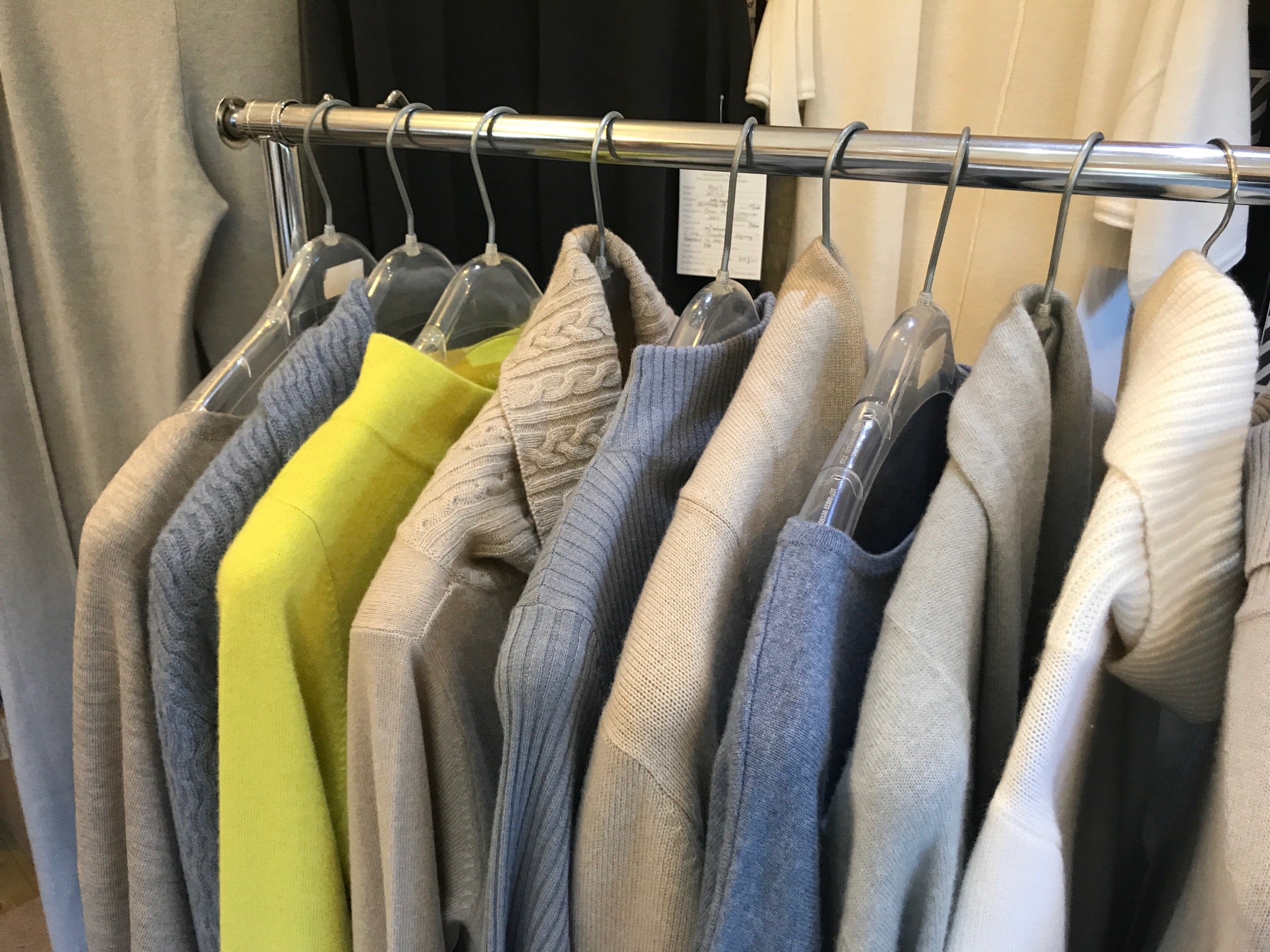Keys Tips to Eternal Style
The fashion industry is one of the main contributors to the current environmental crisis. The production of cheap garments made from destructive materials, which are fast to make and quick to perish, have led to a surge in waste and greenhouse gas emissions.
It doesn’t have to be this way. Our planet needs each of us to do our bit and that can start with your wardrobe. Below, we provide you with the key tips to more sustainable, planet-friendly, eternal style.
Buy Less – Buy Better
A mantra that is often repeated and for good reason. Cheap clothes are not designed to be ‘timeless’ and will lose their shape after just a few wears. Investing in quality pieces will fill your wardrobe with valued garments with which you will create years of memories.
Quality cashmere garments will last for generations if cared for appropriately and so it is important to know what to look for when purchasing. Cashmere royalty Belinda Robertson explains how to find your timeless piece in our guide to buying cashmere.
Embrace Natural Fibres
We are a society at war with plastic, diligently remembering our tote bags when shopping, using keep-cups and refusing plastic straws. All measures to address our addiction with plastic that is polluting every corner of the planet.
One of the main plastic polluters, however, is hiding in our wardrobes and now makes up over 60% of all clothing.
Synthetic fibres are man-made plastic-like fibres derived from chemicals. Nylon, polyester and acrylic, these chemically processed materials have exploded in popularity as a cheaper alternative to natural fibres with which to produce clothes.
Natural fibres include cashmere, wool, organic cotton, silk and linen and come from plants and animals and are far better for the planet. They are naturally derived, free from fossil fuels and chemicals, and biodegrade at the end of their life cycle, leaving no trace of their existence.
A garment’s composition can be found on the label and is usually listed on the page if you are buying online. We detail the many benefits of natural fibres over synthetic here, but in short, natural fibres: last longer, offer greater comfort, don’t fill our oceans with plastic, biodegrade and involve no dirty chemicals.
Natural fibres may provide one of the solutions to the fashion crisis but must be consumed responsibly. When choosing plant-based fibres like cotton, always opt for organically grown.
For cashmere and wool, there are growing concerns over overproduction. Its therefore so important to buy responsibly, make the most of your cashmere when you have it and recycled it when you’ve come to the end of your journey with it.
Garment Care
Looking after your garment will help retain its shape, keep it soft, and ultimately make your piece last longer.
In addition to caring for your clothes, storing them safely will also help prolong the life cycle of your garments. Pesky moths can wreak havoc on a beloved knitwear collection so keep them away using our sweater bags and anti-moth products.
Click here to get the full potential out of your cashmere and discover the art of garment care.
Second Hand
Luxury pieces retain their quality for years, so shopping second hand is a great way to find quality pieces with years of wear left to give.
Websites like Vestiaire Collective, Depop and HEWI are great places to start, while there’s nothing better than uncovering a gem with a visit to a second-hand pop-up sale or charity shop.
Be Wary of Greenwashing
Greenwashing is when a brand seeks to capitalise on the growing demand for sustainability by falsely marketing their product as ‘green’ or running their brand counter to the ‘sustainable’ message it preaches.
As environmental awareness grows, more brands are greenwashing their marketing with the introduction of ‘sustainable’ lines and token ‘green’ gestures. These often fail to translate into any environmental benefit.
It’s important to be aware of brands that do this and stay wary of ‘sustainable’ initiatives. Our guide to greenwashing will help you avoid brands that are using the environmental crisis as a marketing tool.
Rehome Your Unwanted Pieces
Clearing out your wardrobe can be a cathartic experience and is highly recommended at least once a year. Pieces that are otherwise collecting dust should be rehomed to a charity like Smart Works to be part of another person’s story.
Embrace the Circular Economy
Landfill should never be the final destination for a garment. If your time with a garment has come to an end, there are a growing number of recycling projects that will turn your piece into something new to begin the cycle once more.
Cashmere is the perfect fibre to be re-loved into new pieces. When you’re truly finished with your cashmere, we’ll recycle any unwanted items so that the 100% natural yarns are kept out of landfill and can be re-generated and re-imagined in new and creative ways.
The journey to a sustainable wardrobe will set you up with a collection of timeless quality pieces which will provide you with years of joy. Say no to poorly made clothes, waste and synthetics, and join the movement to eternal style.
Tell us about your journey!

